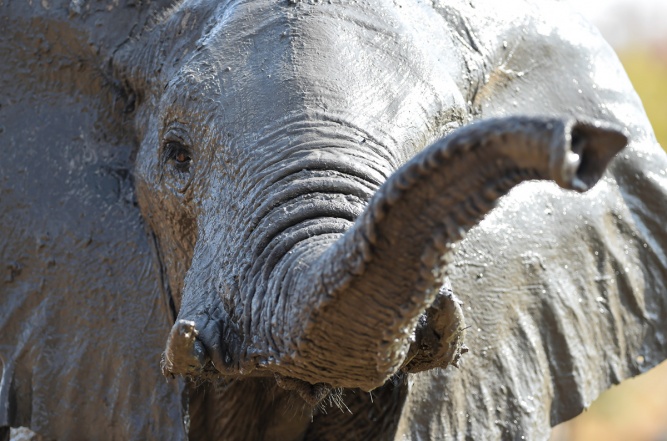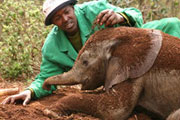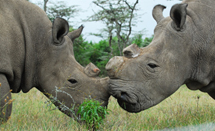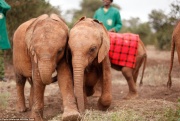The Last Elephants & how to help save elephants in Africa
The Last Elephants, published in March 2019, consolidates the thoughts, findings, and experiences of researchers, rangers, scientists, and conservationists combining their narratives with over 250 color photographs of African elephants. Authors, Don Pinnock and Colin Bell compiled The Last Elephants as a means to help preserve the species and create awareness about the elephant crisis, as well as to pay tribute to all those involved in elephant conservation.
The Africa-wide Great Elephant Census of 2016 produced shocking findings: a decimated elephant population whose numbers were continuing to plummet.
Elephants are killed, on average, every 15-20 minutes - a situation that will see the final demise of these intelligent, extraordinary animals in less than three decades. They are a species in crisis.
This magnificent book offers chapters written by the most prominent people in the realm of conservation and wildlife, among them researchers, conservationists, film makers, criminologists, TV personalities and journalists. Photographs have been selected from among Africa’s best wildlife photographers, and the Foreword is provided by Prince William.
It is hoped that this book will create awareness of the devastating loss of elephant lives in Africa and stem the tide of poaching and hunting...
The Last Elephants is a response to the Great Elephant Census report of 2016, which starkly revealed the steep decline in elephant numbers in most parts of Africa. The book is a bid to prevent the extinction of nature’s most sentient and worthy creatures.
This extract from the book outlines the ways you can get involved in elephant conservation.
How to get involved & make a difference in the elephant crisis
As a traveller to Africa – and being someone who wants to make a contribution – species protection and taking care of their habitats is a great place to get involved. And elephants, one of the most charismatic and loved of all animals, are the torch-bearers. They are also indicators of the health of all other species: their status is a barometer of the condition of biodiversity and ecosystems in general. By getting involved, you will make a difference. There are many different ways to become involved with saving Africa’s elephants.
Go on safari in Africa
By traveling to Africa and going on a safari, you will already be making a significant contribution through the park and other conservation fees you pay, as well as the jobs that you will support.
Be sure to select a reliable and ethical tour operator and include in your itinerary places that have wild elephants. A well-constructed safari will provide both a wonderful, uplifting experience and make available much-needed funds for wildlife conservation. That way you become simultaneously a tourist and a champion of conservation.
See where to go to see elephants in the wild or chat with one of our African travel experts for affordable safari options.
Be aware of elephant conservation issues
Become aware of the issues regarding the conservation of elephants and stay informed. This includes finding out about the poaching crisis and why trading in ivory is intimately linked to the alarming decline in elephant populations. Trade is not a solution to the long-term survival of the species. Never buy ivory.
Consider all the different stakeholders involved: government and other decision-makers, the scientific community, conservation agencies, the role of ecotourism. Think carefully about the choices you make, bearing in mind the possible outcomes of such choices, and the impact beyond your own particular involvement.
Become an elephant advocate
Become an outspoken advocate for elephants. Make your voice heard. Informed and inspired by your safari experiences in Africa, use your newfound knowledge to stand up for elephants. Thus empowered, go out and spread the news of their plight among family, friends, colleagues, and governments on behalf of the animals that are otherwise voiceless. This includes writing and petitioning.
Contribute to the right campaigns
Nearly all the contributors or organizations represented or listed in The Last Elephants work with elephants and their conservation. If you want to offer support with a donation, start with contributing to any one of them.
Join campaigns advocating the right to survival of elephants through securing and expanding their habitat, including corridor and transfrontier initiatives. Without the habitat they require, all efforts to rescue these animals are diminished. This can be done through donations, as a volunteer in range states, or as an educator and advocate. Whichever way you choose, be aware that these efforts are long-term and be prepared to dig in on behalf of elephants.
Volunteer at wildlife organizations
If you wish to be involved on the ground, then join an internship or volunteer program. Typically, these offer a variety of activities from administrative work to being a research assistant and educator. But be careful: there are many volunteer organizations that do great work – and there are others that are merely business-oriented, no matter what they say on their websites.
Be a responsible consumer
Certain products such as coffee, wood and various fruits may have been procured and produced at the expense of elephants and other wildlife species. Before buying such products, determine their status.
Become a citizen scientist
There are a number of initiatives, often using apps and tracking, downloading or photographic techniques and methods that enable you, while on safari, to provide valuable information on elephants, and so contribute to conservation efforts.
DO NOT: Avoid the following
Don’t support operations that offer elephant-back riding or other forms of animal exploitation using elephants in captivity – they are not regarded as conservation initiatives. By supporting them through visits or donations, you will not be contributing to the survival of the species. Instead, you will be entrenching a cycle of use and abuse.
Do not visit zoos or so-called sanctuaries that keep elephants under poor conditions.
When in Africa or anywhere else, do not buy any products – jewelry, crafts or antiques, for example – that use ivory, elephant hair or any other body parts as this promotes the killing of these animals.
For more details see The Essential Safari Anti-Bucket List - Things to Avoid & Helpful Alternatives & Responsible Safari: how to travel ethically
DO: Ways to help conserve elephants
- Buy The Last Elephants on Amazon (Kindle and paperback versions available)
- Like The Last Elephants on Facebook & follow The Last Elephants on Instagram
Support Legitimate NGOs
- African Parks Network - multiple African countries
- Born Free Foundation - global
- Big Life Foundation - Kenya & Tanzania
- Conservation Action Trust - South Africa
- Conservation Lower Zambezi (CLZ) - Zambia
- EAGLE Enforcement - Central & West Africa
- Elephants Alive - Southern Africa
- Amboseli Trust for Elephants - Kenya
- Elephant Voices - Kenya & Mozambique
- Elephants without Borders - Botswana
- Endangered Wildlife Trust - South Africa
- Community Markets for Conservation (COMACO) Trust - Zambia
- Game Rangers’ Association of Africa - across Africa
- Last Great Ape Organization (LAGA) - Cameroon
- Northern Rangelands Trust - Kenya
- PAMS Foundation - Tanzania
- Peace Parks Foundation - Southern Africa
- Save The Elephants - Kenya
- Space for Elephants Foundation - South Africa
- The Zambezi Society - Zimbabwe
- Tsavo Trust - Kenya
- Tusk - multiple African countries
- WILD Foundation - global
- Wild Aid - global
- Wilderness Foundation Africa - South Africa
- Wildlife Conservation Society - global
- Wildlife Direct - Kenya / global
- WWF South Africa - South Africa/global
Find out more in Wild's interview with co-author Don Pinnock: The Last Elephants: are these majestic animals facing extinction?
If you liked this post, these trips cover similar ground…
- Fly & Drive Amboseli & Ol Pejeta Kenya Safari
- Kenya Lodge Safari: Tsavo & Amboseli Parks
- 7 Day Chobe, Okavango Delta & Moremi Lodge Tour
- Moremi, Okavango Delta & Chobe Camping Safari in Botswana
- 3 Day Kruger National Park Safari - Lodge Tour















 Landia is a nature and animal lover. This South African woman avoids crowds seeking out quiet places. She has worked in the African safari industry for over 16 years!
Landia is a nature and animal lover. This South African woman avoids crowds seeking out quiet places. She has worked in the African safari industry for over 16 years!











